The Dendroica Project: An Introduction
Over the past two years, I have written a great deal about politics, about the problems, inequities, and crises of our time. I envisioned an economy of, for, and by the people. I imagined an expanded framework of social justice that might be inclusive rather than divisive. I urged people to escape from the narrative matrix of mainstream thought and media. I discussed an ongoing bipartisan movement toward authoritarianism and censorship and pleaded for a return to the principles of democracy. I envisioned the ongoing flight from truth and embrace of scapegoating as part of grieving the end of progress, and of the associated civil religion of Progress. More recently, I have expressed serious concerns about the safety of the current Covid-19 vaccines, and have registered my firm opposition to attempts to mandate these vaccines - a position which places me in an unpopular minority in my local community. This has been a journey of self-discovery and awakening, and I hope that my writings have been helpful to others as well.
At the same time, I have lamented the ever-increasing division in our society, with political “tribes” no longer able to communicate or to respect the basic humanity in the opposing side. With the arrival of the vaccine issue, it seems that the division has finally come for me; by making a choice based on my personal sense of integrity and my best understanding of available science (and I say this as someone with a PhD in Biological Engineering who has read 100+ primary research articles as part of this quest), I have joined the ranks of pariahs, labeled as “anti-vax” and forced into a battle to preserve my access to basic human rights and services and to avoid becoming an officially-sanctioned second-class citizen.
It is not lost on me, however, that this conflict is simply one more click in the ratchet of divisiveness, and that so long as we continue to fight among ourselves we will never be able to create the change that we seek. I also acknowledge that this particular issue puts me at odds with dear friends who are also working toward a better world, and who firmly believe that taking these vaccines is an act of love and empathy and refusing them is an act of selfish defiance. I cannot control what others might think of me, but I seek to hold love in my heart even for those who disagree.
In all of my critiques of the world that we live in, with its dysfunctional and inequitable systems stumbling toward inevitable resource shortages and its belief in Progress clearly on a collision course with physical limits, I can feel a bit lonely. Even if others feel similarly, to escape from the narrative matrix is to enter a chaotic world of raw experience, where the rules are unwritten, reality itself is shaky, and it is almost irresistibly tempting to dive back into the familiar stories, the agreed-upon realities of our tribes.
What we need, then, is to avoid being constantly called to the fight, kept outraged, afraid, and opposed to some other. We need to start building something new: a commonplace, a way of seeing the world, of finding meaning within it, of growing shared experiences and realities across cultural and ideological divides. Such will be the focus of this Substack. I will still post occasional political and philosophical essays on my other blog, but the focus here will be distinct. I plan to post a new essay once every month, around the 21st, with a special focus on the Equinox and Solstice days - although to start I will pull over some of my older writings that fit into this theme. Other authors are welcome to submit writings for posting or re-posting here as well.
Spring in Minnesota was, for me as a child and young adult, always a time of great joy. First the long-awaited thaw brought trickles of snowmelt and rich scents of damp earth and moss-covered trees long hidden by the crisp bite of deep winter air. Then the bloodroots and trout lilies sprang from the earth beneath still-bare trees, as White-throated Sparrows searched for seeds among last year’s fallen leaves and tiny fire-capped kinglets flitted among the branches seeking the first awakening insects, sometimes curiously approaching the humans peering up at them with wonderment. Finally nature burst forth in a grand awakening, a great re-greening and blossoming with owls calling on warm fragrant nights and new leaves unfurling to greet the May sunshine. That was the time of the warblers - the myriad energetic sallying songsters, each as if designed by a master artist, though clearly not for my benefit - arriving after a northward journey of some three thousand miles from the tropical rainforests of Central and South America and most bound still further north, to the ephemeral invertebrate bounty of the great Canadian boreal forests.
I passed countless hours with my eyes in the canopy, content to simply be in the presence of so much life, so much beauty, all of these Dendroica warblers exuberant in their annual migration. Dendroica. Dendr- (Latin, tree) plus oikos (Greek, home). Tree-dwellers. A most fitting name for these jewel-toned inhabitants of the high branches.
I treasured these moments because the warblers called me into the present, into participation with an ancient, conscious, miraculous, and ever-renewing world. These were moments of joy and wonder, free from fear or anxiety, tinged perhaps with a bittersweetness of time and change, a recognition that this moment will never come again and so must be savored and consigned to memory.
My memories of warbler-filled spring days are one of the reasons I have chosen the name Dendroica for this project, but the feeling I wish to capture is by no means limited to warblers. I have had a similar sense of calm, pure, benevolent belonging when camped near alpine lakes; when singing harmonies with dear friends from treetops, around bonfires, or in cozy fire-warmed living rooms; when standing in thunderstorms, blizzards, and windstorms; when gazing at the night sky and learning the stars and constellations; when catching the first scent of daphne, lilac, or basswood blossom; when sowing seeds, digging potatoes, and picking apples; when sharing the products of my labor with friends and feeling appreciated in return. Others may find such sacred awareness in dance, in swimming, in rock climbing, in crafts, in cooking. The paths we choose are our own, but the experience is much the same, and could serve as a much-needed commonplace - an avenue of shared meaning, experience, and humanity to cut across the ever-widening social chasms and ever-stoked fears that seek to divide and isolate us.
The second reason I have chosen Dendroica as a name for this project is as an act of defiance against a particular, unfortunate trend of our time. You see, Dendroica is now a dead name, and my biologist friends will perhaps chastise me for using it. The warblers are now classified in the genus Setophaga - moth-eaters. The reason for this is rather pedestrian; modern gene sequencing has been refining the taxonomy of many species to better reflect evolutionary relationships. It so happened that the genera Dendroica and Setophaga were merged together, and Setophaga - having been named first - became the new combined genus following taxonomic convention.
It could just as easily have gone the other way, but I am personally saddened by the loss of Dendroica, which is both linguistically mellifluous and particularly suited to these denizens of the arboreal world. In a way, the transition from tree-dwellers to moth-eaters in the name of taxonomic progress mirrors countless other transitions from form (being) to function (doing), a devaluing of individual consciousness, awareness, and autonomy, also in the name of progress. So it is that forests have become timber resources, craftsfolk have become employees and more recently human resources, rivers and lakes have become water resources, and so on. That which was once valued for itself has instead become valued solely in terms of what it can do, what services it can provide. These changes in language reflect changes in the way we view the world, increasingly through a mechanistic, materialistic lens that removes magic, mystery, and sacredness in favor of function, production, and efficiency.
A central goal of The Dendroica Project is to reverse this trend, to re-animate the natural world, to re-personalize human interactions and transactions, to de-commodify the fruits of our labors, to re-enchant life with beauty and meaning, here and now - not consigned to some vision of afterlife or transcendence or future utopia.
The final reason I have chosen Dendroica is to plant a seed for a similar conception for our own species. As warblers are tree-dwellers, so might we be Earth-dwellers: at home and in love with the planet we inhabit, not seeking to blast off into space or ascend into metaphysical bliss. Whatever we each believe is to come after, we are here now, and to pretend otherwise or to project our fear and focus into the future is to miss out on the warblers, the song circles, the harvests, and all of the overlooked wonders of our daily existence.
Before I launch this project, I want to clarify what exactly I intend it to be, and what I intend to avoid.
The Dendroica Project is intended as an antidote to modern consumer culture, to an increasingly digitized, atomized, socially-isolated, commodified, sterilized, artificial world. As such, it will seek to remember some older ways of seeing and being that have been largely abandoned and forgotten in recent years. It is not, however, an attempt to romanticize the past or to suggest that we should return to the the “good old days” - although I can be sure that I will field that critique from at least some true believers in Progress.
The Dendroica Project seeks to embrace and strengthen what author John Michael Greer has described as an emerging religious sensibility based on finding sacredness and spiritual meaning in being a part of the Earth’s biosphere and natural cycles. It seeks re-enchantment of everyday life, including both our natural world and our human communities. It seeks to support the growth of an alternative to the dying civil religion of Progress that is neither atheistic/materialistic nor couched in a traditional religion. It is open to metaphysical stories and experiences that intersect with this world, in the form of nature spirits, devas, ghosts, visions, unexplained mysteries, etc. It does not make claims about the afterlife or the nature of nonphysical existence, and it is open to believers in any spiritual tradition. That said, the Dendroica Project rejects any spiritual belief or tradition which seeks to devalue physical and biological existence as an illusion, a trial to be suffered ahead of eternity in Heaven, or an experience in density to be transcended.
The Dendroica Project is emphatically not a utopian vision for the future. It acknowledges that we are entering a period of decline and ecological overshoot, and that life in the decades ahead will in many ways be more challenging than in the past century or so. However, it also finds solace rather than disappointment in the realization that humans will not have the energy and resources to completely remake the planet and colonize space. The future may not be sunshine and roses, but it will have sunshine on roses (and warblers and oak trees) - marvels of the biosphere that are conspicuously absent from the techno-city and spaceship fantasies of Progress believers.
The Dendroica Project recognizes that fear, doubt, guilt, and judgment are normal and acceptable parts of the human experience, but it also recognizes that these sentiments are well represented elsewhere and that a refuge of sorts is direly needed. As such, writings here will to the greatest extent possible be free of fear - of death, of infection or spreading infection, of loss of control, of being controlled, of being judged. Writings here will avoid feelings of guilt for past deeds and will seek to be accepting of pain and death as normal parts of human experience.
The Dendroica Project extends an open invitation to anyone who has ever felt a spark of wonder upon catching a firefly, an indescribable joy upon hearing a whip-poor-will, a rush of emotion and memory upon catching a scent on the air, a deep sense of connection to the world while watching a warbler, or a deep appreciation for all of life upon tasting a wild strawberry or a homegrown tomato. It is not a place to debate contentious or divisive issues, and it emphatically rejects any attempt to divide humanity into Good People and Bad People.
The Dendroica Project does not imagine some sort of wilderness “untrammeled by Man” as an ideal form of nature. Instead it encourages participation and wonder in backyards, in gardens, anywhere there is wildness to be found. It is equally welcoming to stories of human connection and re-personalization of workplaces, neighborhoods, and communities.
The Dendroica Project rejects the common idea that story or emotion ought to lead to a particular belief or action. Thus stories of communion with warblers posted here are shared purely as an expression of joy and meaningful personal experience, not as an attempt to convince others to feel guilty about habitat destruction or to take some action toward conservation. This is not to say that such feelings might not emerge naturally, or that a society with a stronger ecological spirituality might not treat its fellow travelers with greater respect, but the tactic of appealing to emotion in order to generate some sort of desired response has become ubiquitous in our divisive world and will not be welcome here.
With that said, let us begin…


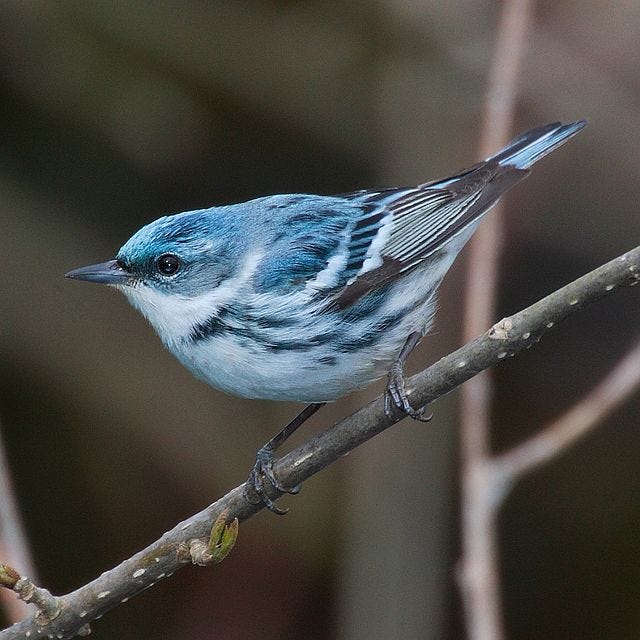
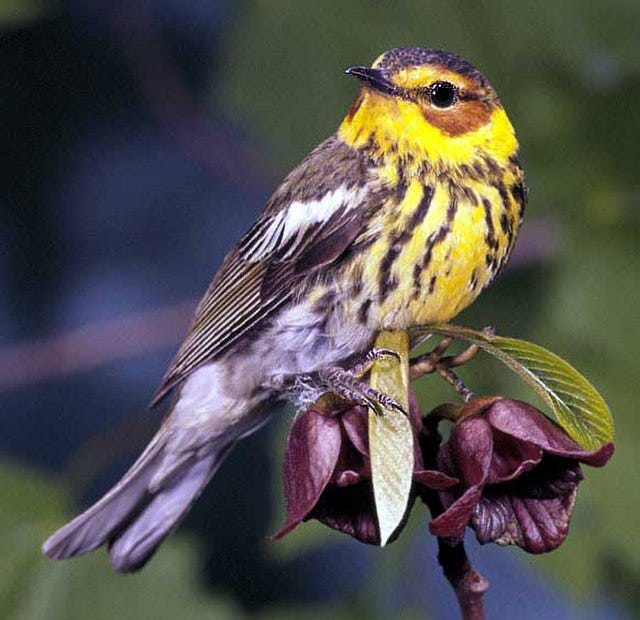
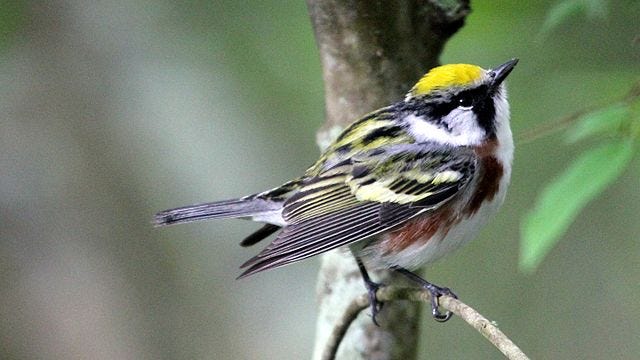
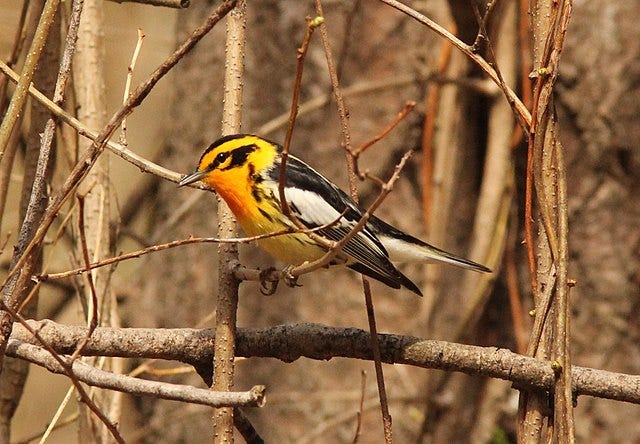
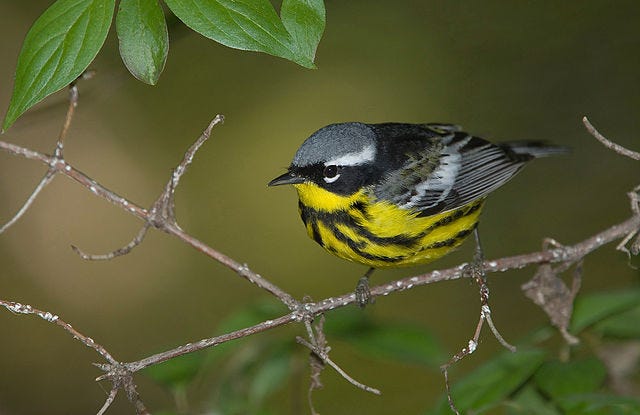
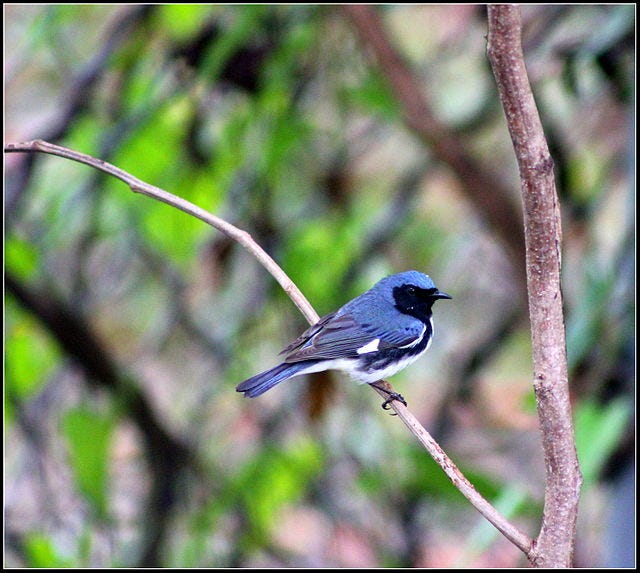
Really good. I am looking forward future posts!
This made me smile and my heart sing: "A central goal of The Dendroica Project is to reverse this trend, to re-animate the natural world, to re-personalize human interactions and transactions, to de-commodify the fruits of our labors, to re-enchant life with beauty and meaning, here and now - not consigned to some vision of afterlife or transcendence or future utopia."
I love to hear more, to connect, to chat from one side of the world (I'm on the west coast of Australia) and to learn from each other in this world that is many, many strange things (including post-choice - a term I just made up).